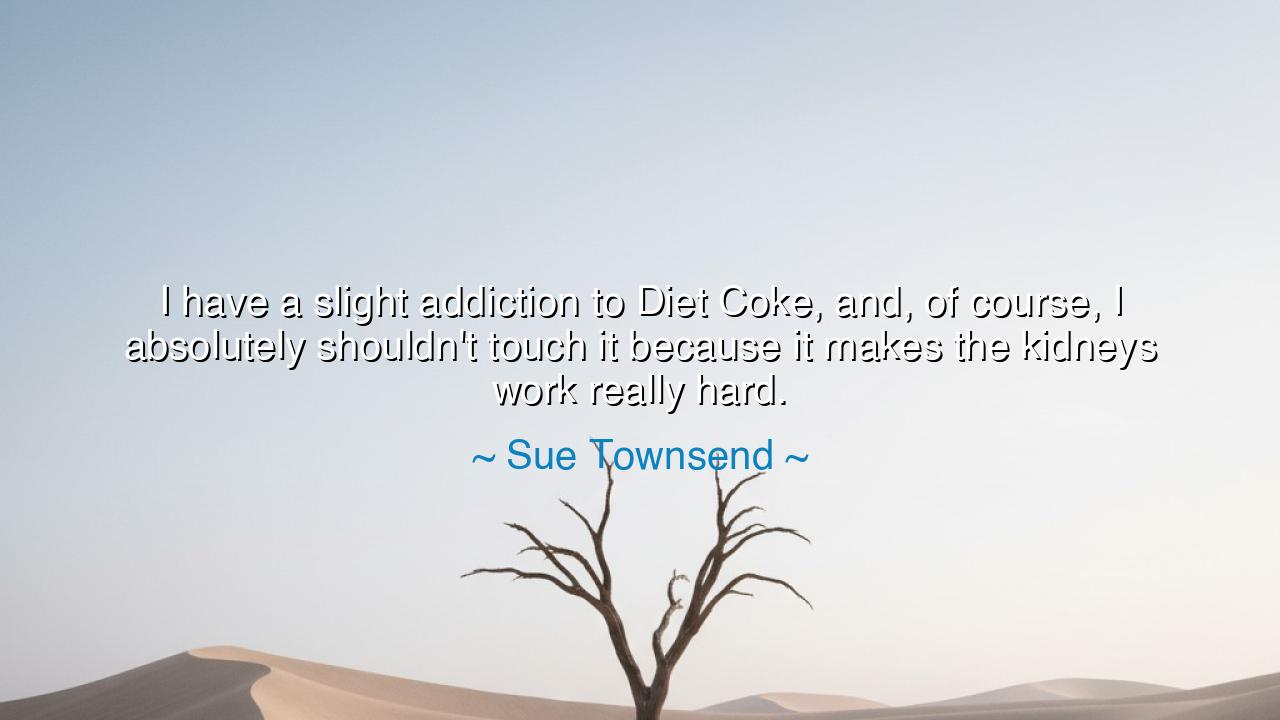
I have a slight addiction to Diet Coke, and, of course, I
I have a slight addiction to Diet Coke, and, of course, I absolutely shouldn't touch it because it makes the kidneys work really hard.






In the words of Sue Townsend, the beloved author whose humor often cloaked deep truth, we hear a confession both lighthearted and profound: “I have a slight addiction to Diet Coke, and, of course, I absolutely shouldn’t touch it because it makes the kidneys work really hard.” Though spoken with wit, this statement reveals the timeless struggle of the human heart — the conflict between desire and wisdom, between what we crave and what we know we should resist. Beneath the laughter lies a quiet lament for the fragility of self-control, and the eternal challenge of mastering one’s own appetites.
In the age of the ancients, this battle was not unknown. The philosophers of Greece and Rome, the mystics of the East, all warned that man’s greatest enemy is not the beast outside the gates but the longing within his own soul. Epictetus taught that freedom is not doing as one pleases, but choosing rightly in spite of one’s longings. Townsend’s playful admission — her “slight addiction” — becomes a mirror for us all. For though her words speak of Diet Coke, they echo the greater truth that even the smallest indulgence, if unchecked, can rule the will. The drink, harmless in appearance, becomes a symbol of all that quietly enslaves us.
Yet, in her self-awareness lies a glimmer of wisdom. She knows the price of her pleasure: “it makes the kidneys work really hard.” Here the modern confession meets the ancient principle — that every act has its cost, and every indulgence, its toll. The body, that sacred vessel which carries us through life, demands reverence. The ancients saw it as a temple, and to burden it carelessly was to invite imbalance. Townsend, in jest, reminds us that health is not merely the absence of illness but the harmony between desire, discipline, and respect for one’s own being.
There is also tenderness in her words — the understanding that to be human is to be flawed, to stumble even while knowing the path of virtue. The poets of old would not scorn her “addiction,” for they too spoke of such frailty. Homer’s Odysseus, though cunning and wise, could not resist the song of the Sirens; and so must we tie ourselves to the mast of reason lest the sweet call of habit lead us astray. Townsend’s candor, wrapped in humor, reveals that awareness is the first victory. To know one’s weakness is to have already begun to rise above it.
In truth, her confession belongs to a world drowning in comforts. We have replaced the simplicity of the ancients — water from the spring, bread from the earth — with concoctions of sweetness and artifice. And yet, like all false gifts, these bring only fleeting satisfaction. Townsend’s warning, veiled in jest, is a reminder to return to balance — to honor the natural, to choose what nourishes over what merely pleases. For health, both physical and spiritual, demands discipline: the courage to deny what harms even when it charms.
Her life itself offers example. Blindness and illness did not still her voice or dim her wit. She transformed suffering into storytelling, addiction into awareness, weakness into wisdom. In this, she stands among the storytellers of every age who taught through laughter, hiding truth in jest. Her humor was not escape, but enlightenment — a light shining upon the absurdity of human frailty, urging us not to despair but to understand.
So let this be the lesson drawn from her gentle confession: be mindful of what you consume, not only with your mouth, but with your mind and spirit. What you take in — whether food, drink, thought, or feeling — shapes the vessel of your being. Do not wait for harm to awaken wisdom. Choose instead the path of harmony: to indulge with awareness, to enjoy with moderation, to live with care. For the body is the servant of the soul, and if you wish for the soul to shine, you must not overburden the vessel that bears it. In this balance, between pleasure and prudence, lies the true art of living — and the quiet power to turn even one’s weaknesses into wisdom.






AAdministratorAdministrator
Welcome, honored guests. Please leave a comment, we will respond soon